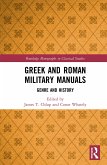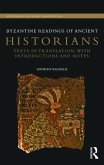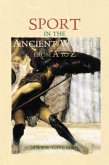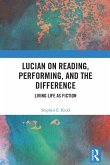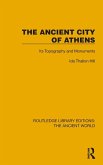Pushing the Boundaries of Historia
Herausgeber: English, Mary; Fratantuono, Lee
Pushing the Boundaries of Historia
Herausgeber: English, Mary; Fratantuono, Lee
- Gebundenes Buch
- Merkliste
- Auf die Merkliste
- Bewerten Bewerten
- Teilen
- Produkt teilen
- Produkterinnerung
- Produkterinnerung
This collection of essays, written by philologists, historians, epigraphers, palaeographers, archaeologists, and art historians, brings together the best of old and new traditions of classical study, from senior emeritus faculty with established records of scholarly productivity, to the newest generation of classics and archaeology professors.
Andere Kunden interessierten sich auch für
![Greek and Roman Military Manuals Greek and Roman Military Manuals]() Greek and Roman Military Manuals155,99 €
Greek and Roman Military Manuals155,99 €![Great Power Diplomacy in the Hellenistic World Great Power Diplomacy in the Hellenistic World]() John D GraingerGreat Power Diplomacy in the Hellenistic World206,99 €
John D GraingerGreat Power Diplomacy in the Hellenistic World206,99 €![Byzantine Readings of Ancient Historians Byzantine Readings of Ancient Historians]() Anthony KaldellisByzantine Readings of Ancient Historians189,99 €
Anthony KaldellisByzantine Readings of Ancient Historians189,99 €![Mediterranean Connections Mediterranean Connections]() A. KnappMediterranean Connections135,99 €
A. KnappMediterranean Connections135,99 €![Sport in the Ancient World from A to Z Sport in the Ancient World from A to Z]() Mark GoldenSport in the Ancient World from A to Z145,99 €
Mark GoldenSport in the Ancient World from A to Z145,99 €![Lucian on Reading, Performing, and the Difference Lucian on Reading, Performing, and the Difference]() Stephen E KiddLucian on Reading, Performing, and the Difference180,99 €
Stephen E KiddLucian on Reading, Performing, and the Difference180,99 €![The Ancient City of Athens The Ancient City of Athens]() Ida Thallon HillThe Ancient City of Athens120,99 €
Ida Thallon HillThe Ancient City of Athens120,99 €-
-
-
This collection of essays, written by philologists, historians, epigraphers, palaeographers, archaeologists, and art historians, brings together the best of old and new traditions of classical study, from senior emeritus faculty with established records of scholarly productivity, to the newest generation of classics and archaeology professors.
Hinweis: Dieser Artikel kann nur an eine deutsche Lieferadresse ausgeliefert werden.
Hinweis: Dieser Artikel kann nur an eine deutsche Lieferadresse ausgeliefert werden.
Produktdetails
- Produktdetails
- Verlag: Taylor & Francis
- Seitenzahl: 314
- Erscheinungstermin: 19. November 2018
- Englisch
- Abmessung: 234mm x 156mm x 19mm
- Gewicht: 617g
- ISBN-13: 9781138046320
- ISBN-10: 1138046329
- Artikelnr.: 54690146
- Herstellerkennzeichnung
- Libri GmbH
- Europaallee 1
- 36244 Bad Hersfeld
- gpsr@libri.de
- Verlag: Taylor & Francis
- Seitenzahl: 314
- Erscheinungstermin: 19. November 2018
- Englisch
- Abmessung: 234mm x 156mm x 19mm
- Gewicht: 617g
- ISBN-13: 9781138046320
- ISBN-10: 1138046329
- Artikelnr.: 54690146
- Herstellerkennzeichnung
- Libri GmbH
- Europaallee 1
- 36244 Bad Hersfeld
- gpsr@libri.de
Mary C. English is currently Professor of Classics and General Humanities at Montclair State University, USA. In addition to publishing articles on Aristophanes as well as on the reception of Greek tragedy, she is the co-author, with Georgia L. Irby, of A Little Latin Reader (2011; 2nd ed. 2017) and A New Latin Primer (2015). Lee M. Fratantuono is Professor and Chair of Classics at Ohio Wesleyan University, USA. Among other works on Latin literature and Roman history, he is the co-editor Aeneid 5 (2015) and Aeneid 8 (2018).
List of contributors; Preface and acknowledgements; Introduction, Mary C.
English and Lee M. Fratantuono; Part I: Herodotean narratives and
cross-cultural comparisons; Chapter 1: Different ways of saying historia
in the prose of Herodotus and Thucydides, Gregory Nagy; Chapter 2: Tyrants'
spectacles in Herodotus, Deborah Boedeker; Chapter 3: Thinking with Sima
Qian's Shiji about Herodotus' fragmented narrative of the story of
Miltiades, Thomas R. Martin; Chapter 4: Settling family feuds: Lysias 1 and
Herodotus' Lydians, Nina C. Coppolino; Chapter 5: East and West in the
Histories of Herodotus and Tacitus, Timothy Joseph; Part II. Historia and
the ancient world; Chapter 6: Thucydides' use of Homer in his Archaeology,
Mary Ebbott; Chapter 7: Models of gift-exchange and practices of
hostage-giving and hostage-taking in classical Persian poetry, Olga M.
Davidson; Chapter 8: Michael Ventris, Sterling Dow, and the initial
reception of the decipherment of Linear B, Stephen Tracy; Chapter 9:
Citizen scholarship in the Homer Multitext project, Neel Smith; Part III:
The development and reception of historical exempla; Chapter 10: Othryadas:
The development of a historical and literary exemplum, Alissa Vaillancourt
and Andrew G. Scott; Chapter 11: No peeking! Athena and Alcibiades, Joseph
Falaky Nagy; Chapter 12: A furious fury: Virgil's Camilla, Livy's Camillus,
and the reconciliations of Juno, Lee M. Fratantuono; Chapter 13: Ovid's
autobiography (Tr. 4.10): Poetic identity and immortality in the poetry of
exile, Matthew M. McGowan; Chapter 14: Billy Collins as a modern-day Ovid:
An Ovidian reading of Collins' Ballistics, Jill A. Coyle; Part IV: Fury,
honor, and historia: Conflict and struggle in the Greek and Roman
imaginations; Chapter 15: Sound effects: Aural aspects of Euripides'
Bacchae, Katie Lamberto; Chapter 16: Evander's love of gore and bloodshed
in Aeneid 8, James J. O'Hara; Chapter 17: A disquiet follows my soul: Civil
war in Livy Book 1, Mark J. B. Wright; Chapter 18: Saint Pilate and the
conversion of Tiberius, Paul F. Burke; Chapter 19: Julius Caesar in the
1960s: Jerome Kilty's stage adaptation of Thornton Wilder's The Ides of
March, Mary C. English; Chapter 20: Edward Robinson's plaster casts and the
battle for the Museum of Fine Arts, Ellen E. Perry; Index
English and Lee M. Fratantuono; Part I: Herodotean narratives and
cross-cultural comparisons; Chapter 1: Different ways of saying historia
in the prose of Herodotus and Thucydides, Gregory Nagy; Chapter 2: Tyrants'
spectacles in Herodotus, Deborah Boedeker; Chapter 3: Thinking with Sima
Qian's Shiji about Herodotus' fragmented narrative of the story of
Miltiades, Thomas R. Martin; Chapter 4: Settling family feuds: Lysias 1 and
Herodotus' Lydians, Nina C. Coppolino; Chapter 5: East and West in the
Histories of Herodotus and Tacitus, Timothy Joseph; Part II. Historia and
the ancient world; Chapter 6: Thucydides' use of Homer in his Archaeology,
Mary Ebbott; Chapter 7: Models of gift-exchange and practices of
hostage-giving and hostage-taking in classical Persian poetry, Olga M.
Davidson; Chapter 8: Michael Ventris, Sterling Dow, and the initial
reception of the decipherment of Linear B, Stephen Tracy; Chapter 9:
Citizen scholarship in the Homer Multitext project, Neel Smith; Part III:
The development and reception of historical exempla; Chapter 10: Othryadas:
The development of a historical and literary exemplum, Alissa Vaillancourt
and Andrew G. Scott; Chapter 11: No peeking! Athena and Alcibiades, Joseph
Falaky Nagy; Chapter 12: A furious fury: Virgil's Camilla, Livy's Camillus,
and the reconciliations of Juno, Lee M. Fratantuono; Chapter 13: Ovid's
autobiography (Tr. 4.10): Poetic identity and immortality in the poetry of
exile, Matthew M. McGowan; Chapter 14: Billy Collins as a modern-day Ovid:
An Ovidian reading of Collins' Ballistics, Jill A. Coyle; Part IV: Fury,
honor, and historia: Conflict and struggle in the Greek and Roman
imaginations; Chapter 15: Sound effects: Aural aspects of Euripides'
Bacchae, Katie Lamberto; Chapter 16: Evander's love of gore and bloodshed
in Aeneid 8, James J. O'Hara; Chapter 17: A disquiet follows my soul: Civil
war in Livy Book 1, Mark J. B. Wright; Chapter 18: Saint Pilate and the
conversion of Tiberius, Paul F. Burke; Chapter 19: Julius Caesar in the
1960s: Jerome Kilty's stage adaptation of Thornton Wilder's The Ides of
March, Mary C. English; Chapter 20: Edward Robinson's plaster casts and the
battle for the Museum of Fine Arts, Ellen E. Perry; Index
List of contributors; Preface and acknowledgements; Introduction, Mary C.
English and Lee M. Fratantuono; Part I: Herodotean narratives and
cross-cultural comparisons; Chapter 1: Different ways of saying historia
in the prose of Herodotus and Thucydides, Gregory Nagy; Chapter 2: Tyrants'
spectacles in Herodotus, Deborah Boedeker; Chapter 3: Thinking with Sima
Qian's Shiji about Herodotus' fragmented narrative of the story of
Miltiades, Thomas R. Martin; Chapter 4: Settling family feuds: Lysias 1 and
Herodotus' Lydians, Nina C. Coppolino; Chapter 5: East and West in the
Histories of Herodotus and Tacitus, Timothy Joseph; Part II. Historia and
the ancient world; Chapter 6: Thucydides' use of Homer in his Archaeology,
Mary Ebbott; Chapter 7: Models of gift-exchange and practices of
hostage-giving and hostage-taking in classical Persian poetry, Olga M.
Davidson; Chapter 8: Michael Ventris, Sterling Dow, and the initial
reception of the decipherment of Linear B, Stephen Tracy; Chapter 9:
Citizen scholarship in the Homer Multitext project, Neel Smith; Part III:
The development and reception of historical exempla; Chapter 10: Othryadas:
The development of a historical and literary exemplum, Alissa Vaillancourt
and Andrew G. Scott; Chapter 11: No peeking! Athena and Alcibiades, Joseph
Falaky Nagy; Chapter 12: A furious fury: Virgil's Camilla, Livy's Camillus,
and the reconciliations of Juno, Lee M. Fratantuono; Chapter 13: Ovid's
autobiography (Tr. 4.10): Poetic identity and immortality in the poetry of
exile, Matthew M. McGowan; Chapter 14: Billy Collins as a modern-day Ovid:
An Ovidian reading of Collins' Ballistics, Jill A. Coyle; Part IV: Fury,
honor, and historia: Conflict and struggle in the Greek and Roman
imaginations; Chapter 15: Sound effects: Aural aspects of Euripides'
Bacchae, Katie Lamberto; Chapter 16: Evander's love of gore and bloodshed
in Aeneid 8, James J. O'Hara; Chapter 17: A disquiet follows my soul: Civil
war in Livy Book 1, Mark J. B. Wright; Chapter 18: Saint Pilate and the
conversion of Tiberius, Paul F. Burke; Chapter 19: Julius Caesar in the
1960s: Jerome Kilty's stage adaptation of Thornton Wilder's The Ides of
March, Mary C. English; Chapter 20: Edward Robinson's plaster casts and the
battle for the Museum of Fine Arts, Ellen E. Perry; Index
English and Lee M. Fratantuono; Part I: Herodotean narratives and
cross-cultural comparisons; Chapter 1: Different ways of saying historia
in the prose of Herodotus and Thucydides, Gregory Nagy; Chapter 2: Tyrants'
spectacles in Herodotus, Deborah Boedeker; Chapter 3: Thinking with Sima
Qian's Shiji about Herodotus' fragmented narrative of the story of
Miltiades, Thomas R. Martin; Chapter 4: Settling family feuds: Lysias 1 and
Herodotus' Lydians, Nina C. Coppolino; Chapter 5: East and West in the
Histories of Herodotus and Tacitus, Timothy Joseph; Part II. Historia and
the ancient world; Chapter 6: Thucydides' use of Homer in his Archaeology,
Mary Ebbott; Chapter 7: Models of gift-exchange and practices of
hostage-giving and hostage-taking in classical Persian poetry, Olga M.
Davidson; Chapter 8: Michael Ventris, Sterling Dow, and the initial
reception of the decipherment of Linear B, Stephen Tracy; Chapter 9:
Citizen scholarship in the Homer Multitext project, Neel Smith; Part III:
The development and reception of historical exempla; Chapter 10: Othryadas:
The development of a historical and literary exemplum, Alissa Vaillancourt
and Andrew G. Scott; Chapter 11: No peeking! Athena and Alcibiades, Joseph
Falaky Nagy; Chapter 12: A furious fury: Virgil's Camilla, Livy's Camillus,
and the reconciliations of Juno, Lee M. Fratantuono; Chapter 13: Ovid's
autobiography (Tr. 4.10): Poetic identity and immortality in the poetry of
exile, Matthew M. McGowan; Chapter 14: Billy Collins as a modern-day Ovid:
An Ovidian reading of Collins' Ballistics, Jill A. Coyle; Part IV: Fury,
honor, and historia: Conflict and struggle in the Greek and Roman
imaginations; Chapter 15: Sound effects: Aural aspects of Euripides'
Bacchae, Katie Lamberto; Chapter 16: Evander's love of gore and bloodshed
in Aeneid 8, James J. O'Hara; Chapter 17: A disquiet follows my soul: Civil
war in Livy Book 1, Mark J. B. Wright; Chapter 18: Saint Pilate and the
conversion of Tiberius, Paul F. Burke; Chapter 19: Julius Caesar in the
1960s: Jerome Kilty's stage adaptation of Thornton Wilder's The Ides of
March, Mary C. English; Chapter 20: Edward Robinson's plaster casts and the
battle for the Museum of Fine Arts, Ellen E. Perry; Index


